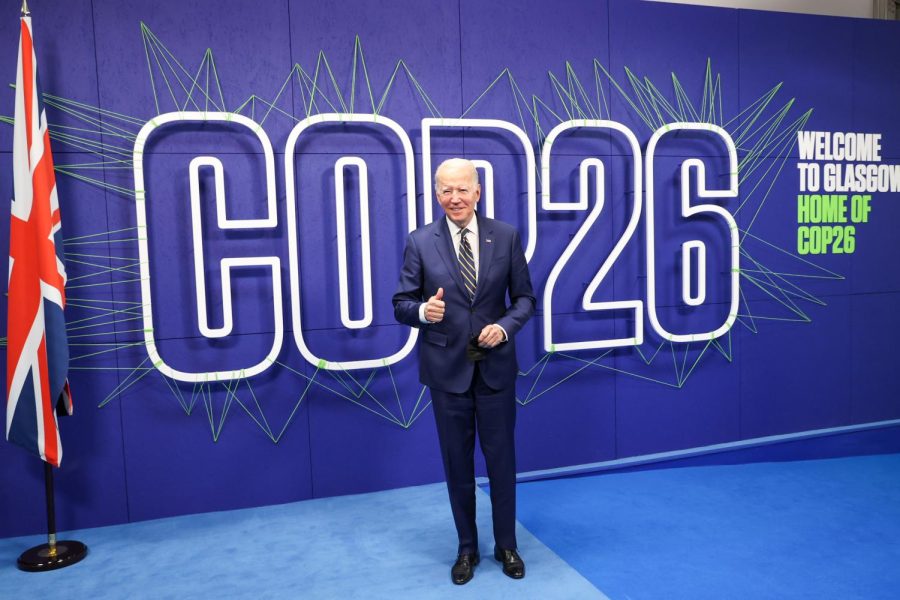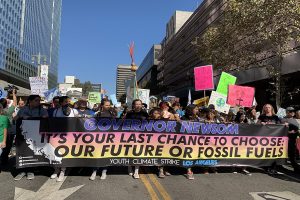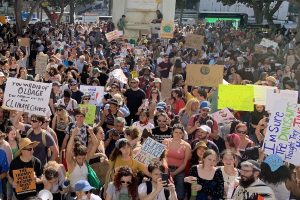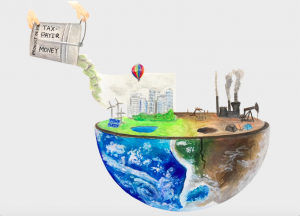World leaders vow to reduce methane leaks and deforestation by 2030 at UN COP26 climate conference
Alan Harvey/UK Government via Flickr
AGREEMENT: On Nov. 2, the second day of the COP26 climate conference, President Biden announced to the delegates that almost all had agreed on a Methane Emissions Reduction Action Plan.
January 10, 2022
When dozens of countries committed to greatly reduce methane leaks by 2030, Science Department Chair Mr. Pavel Lieb was pleased.
Methane, Mr. Lieb said, is a particularly dangerous greenhouse gas, accounting for a third of the global warming from human activity.
Efforts to curb global warming have usually focused on emissions of carbon dioxide (CO2), Mr. Lieb said. But individual methane molecules have a more impactful warming effect than CO2 molecules.
Not only that, but methane, he said, is easier to control than CO2.
Now, as a result of the 26th annual United Nations COP26 climate conference, there will be a growing focus on tackling methane first.
“It’s tough for us to focus on carbon dioxide,” said Mr. Lieb,“because it comes from several different sources. It’s relatively simple to minimize releases of methane.”
That’s partly because methane doesn’t come from burning energy to power cars and heat homes – activities that are harder to reduce. Aside from coal and gas production, it comes from decomposition of garbage and the metabolism of animals like cattle and goats which chew their cuds.
“Methane isn’t necessarily a byproduct of energy generation, which we need,” he said. “It would be easier to minimize, let’s say, agricultural inputs of methane. That’s something that would be achievable and financially reasonable.”
Meeting in Scotland last month, leaders from every continent agreed to a range of promises that, if kept, would hold the global temperature under the threshold scientists say will bring the planet to unimaginable ruin.
One hundred and ten world leaders attended the summit.
Methane comes from the production and transportation of coal and natural gasses, as well as livestock and the decay of organic waste. It’s the main ingredient in the natural gas that’s used as fuel for things like cars and homes.
On Nov. 2, the second day of the climate conference, President Biden announced to the delegates that an international Methane Emissions Reduction Action Plan had been agreed upon.
Although the pledge was first announced in September, Biden officials had continued working to get more countries to sign.
He also announced that the United States committed to preventing millions of tons of greenhouse methane gas from entering the atmosphere by targeting methane leaks from oil and gas rigs all over the country.
That plan calls for the U.S. to regulate numerous oil and gas facilities, as well as incentivize voluntary methane emission reduction programs.
The US is the largest industrial transmitter of methane in the world, stemming from its oil and gas industry, and it is responsible for 30 percent of total methane emissions.
Dozens of countries committed to the initiative, although China, Russia and India, who emit much of the world’s methane, so far have not.
“We have to make those countries see that methane emissions are harmful, but they’re already seeing in places like India that the air quality is so bad they cannot let kids outside of the house,” Mr. Lieb said.
“At first it was because of the pandemic, but now it’s because of the air quality. So I think that once they start seeing that the effects of their actions affect their own people, they will be more incentivized to help out.”
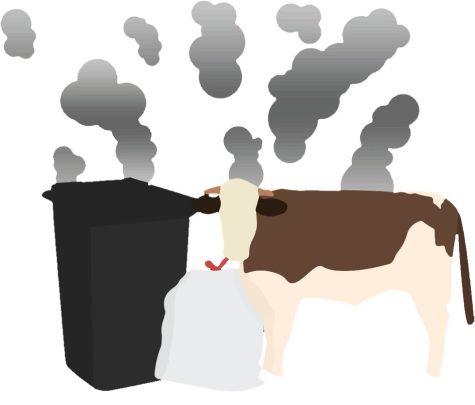
Another major contributing factor to climate change is believed to be deforestation. Trees absorb CO2, and a lack of trees means more CO2 won’t be absorbed, leaving it in the air to continue to warm the Earth.
When the conference was over, experts said its plan would work, but worried these plans will not actually happen – as happened after 2014, when a pact called the New York Declaration on Forests was adopted but failed to slow deforestation at all.
This time the leaders, including those of the United States, Canada, Brazil, Russia, the United Kingdom and China, together committed $12 billion of donations to fight wildfires, restore land, and help indigenous communities. The countries who have signed on in total cover around 85 percent of the world’s forests.
Additionally, private corporations pledged $7.2 billion to support deforestation-free agriculture.
In an interview, Mr. Lieb said public policy is important in the fight against climate change and deforestation.
“Needing to end deforestation through public action is really important because otherwise there’s no incentive to minimize the presence of greenhouse gasses in the environment thus leading the world to the place where it’s at now, and maybe things becoming even worse,” Mr. Lieb said.
He believes this year’s conference will help finance actions combating climate change in developing countries, as well as incentivizing ending deforestation.
“I think what will come out of this is more investment in, or more redistribution, in funds from wealthier countries to less wealthy countries so they can invest more in clean air technology,” he said. “In terms of deforestation, hopefully it will economically disincentivize countries from cutting down forests.”
Also at the conference, 28 countries promised to stop trading certain agricultural products that directly result in deforestation. These products include palm oil, soya, and cocoa.
Brazil, home to the Amazon rainforest, is also signing on to the deal. According to Popular Mechanics, The rainforest plays an essential role for the climate, regulating the world’s oxygen and carbon cycles, as well as producing around six percent of the world’s oxygen, absorbing enormous amounts of carbon dioxide from the atmosphere.

